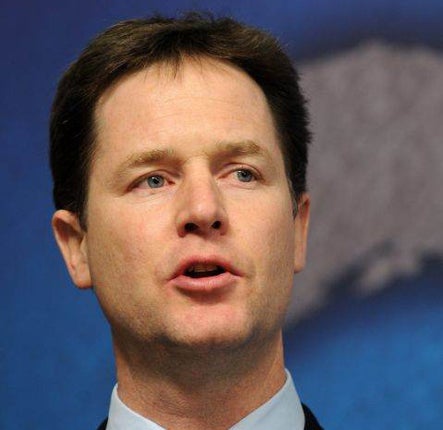My demands for a post-election deal, by Nick Clegg
In an exclusive interview, Lib Dem leader explains how he will decide between Labour and Tories in the event of a hung parliament

Nick Clegg will this weekend announce the four "tests" he would set for Labour and the Conservatives in return for the support of the Liberal Democrats if neither main party wins an overall majority at the general election.
In an interview with The Independent, the Liberal Democrat leader also revealed that his party would try to calm jitters in the financial markets about a hung parliament by calling for a £10bn "repayment" to cut Britain's public deficit. It would be found from £15bn of spending cuts to be outlined this month.
Mr Clegg will use his party's spring conference in Birmingham starting tomorrow to unveil "four steps to fairness" that would be his initial negotiating demands for backing a minority government led by David Cameron or Gordon Brown.
They are a shake-up of the tax system to lift four million people out of tax by raising tax thresholds to £10,000, with higher taxes for the rich; a boost to education spending targeted at children from poor families through a "pupil premium"; a switch to a greener economy less dependent on financial services; and political reform including a new voting system for Westminster elections.
In his interview, Mr Clegg declined to speculate whether his party would lean towards Labour or the Tories and insisted that all options, including a formal coalition with Liberal Democrats sitting in the Cabinet, were possible. He said he would talk to the party that won the "strongest mandate".
He pledged that his party's priority would be to ensure "stable government" and to be a "guarantor of fiscal responsibility".
Mr Clegg launched a scathing attack on the Tories, accusing them of whipping up fears in the City of London that a hung parliament would create a run on sterling as a minority government would lack the political will to tackle Britain's £178bn deficit.
He insisted: "We are the guarantee, if you are worried that Labour is not taking it [the deficit] seriously enough and Gordon Brown is in denial.
"We are the guarantee that it will be taken seriously because we are candid and open about the enormity of the problem. If you are worried that the Tories would cut the deficit from day one when there is no economic case and when the effect would be unfair, you can rely on us to make sure that cuts would be implemented when the economy can sustain it and in a way that is fairly distributed."
The Liberal Democrat leader argued that an "open-ended" election result could be "a virtue" because his party would have the most detailed and costed plan for tackling the deficit of any party.
He will spell out £15bn of cuts in the run-up to the Budget, which the Government confirmed yesterday will be delivered on 24 March, paving the way for a 6 May election.
Almost a third of the savings would be spent on creating jobs and improving schools for the disadvantaged. The rest would be "a down payment" to reduce the deficit.
Ideas for savings already floated by Vince Cable, the Liberal Democrats' Treasury spokesman, include a freeze on the public sector pay bill; scrapping bonuses for civil servants; a review of public sector pensions; abolishing quangos; axeing the renewal of the Trident nuclear missile programme, identity cards and a computerised system for NHS patient records. Some of these will become official party policy before the Budget.
Mr Clegg described warnings by David Cameron, George Osborne and Kenneth Clarke about market instability in a hung parliament as "an act of economic vandalism and a political protection racket".
He added: "They are basically saying, 'Vote Conservative or the markets in the City of London will tear the house down'. It is a very thuggish threat – using the markets for short-term political benefit, warning people that their savings and jobs are at risk because their mates in the City would not tolerate anything other than the result we want."
The Liberal Democrat leader denied that the prospect of political deadlock after the election had caused a run on the pound in the past two weeks. "Sterling was at £1.38 to the dollar last March when the Conservatives were 15 points ahead in the polls," he argued. "There has been a general decline in confidence in UK plc."
He said: "The markets have got to be smart and thoughtful about the politicians and the reverse is true: the politicians must be smart and thoughtful about the markets."
The Tories have pledged to "make a start" in reducing the deficit this year but Labour had warned that this could plunge Britain back into recession and want to delay cuts until next year. The Liberal Democrats will offer a middle way, Mr Clegg revealed.
"The crucial thing is to show the markets that you have a plan [for cuts]. A secondary issue, a wholly different issue, is when to press the 'Go' button for that plan to start. There is nothing magical about a 7 May date in the diary," he said.
"It must be governed by economics, not by political timetables or political dogma. The markets will be much calmer about the issue of timing once they are satisfied that the politicians have a plan."
Accusing the Tories of a "macho, tub-thumping masochistic approach" to cuts, he said: "They keep banging on about a timetable because they don't have a plan. We want to turn this on its head. We are not fixated on a timetable. It will happen at a time when it is most sensible economically."
Join our commenting forum
Join thought-provoking conversations, follow other Independent readers and see their replies
Comments
Bookmark popover
Removed from bookmarks